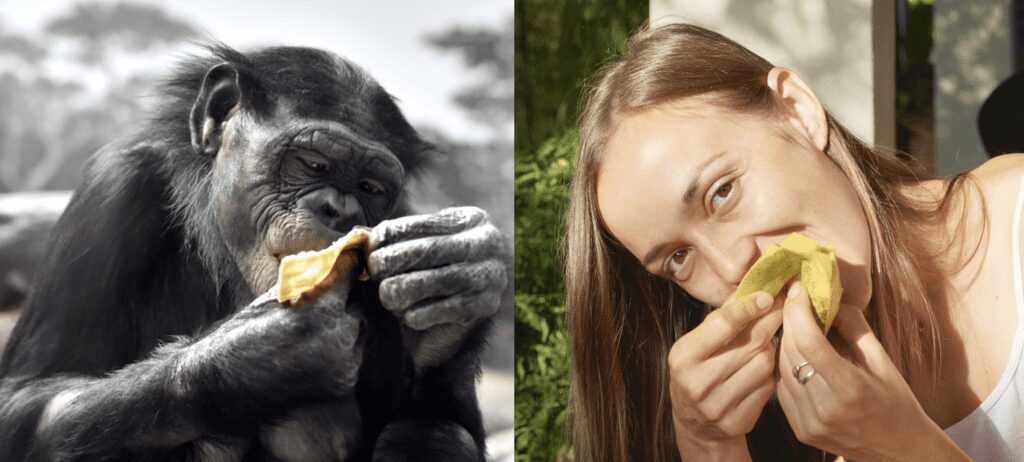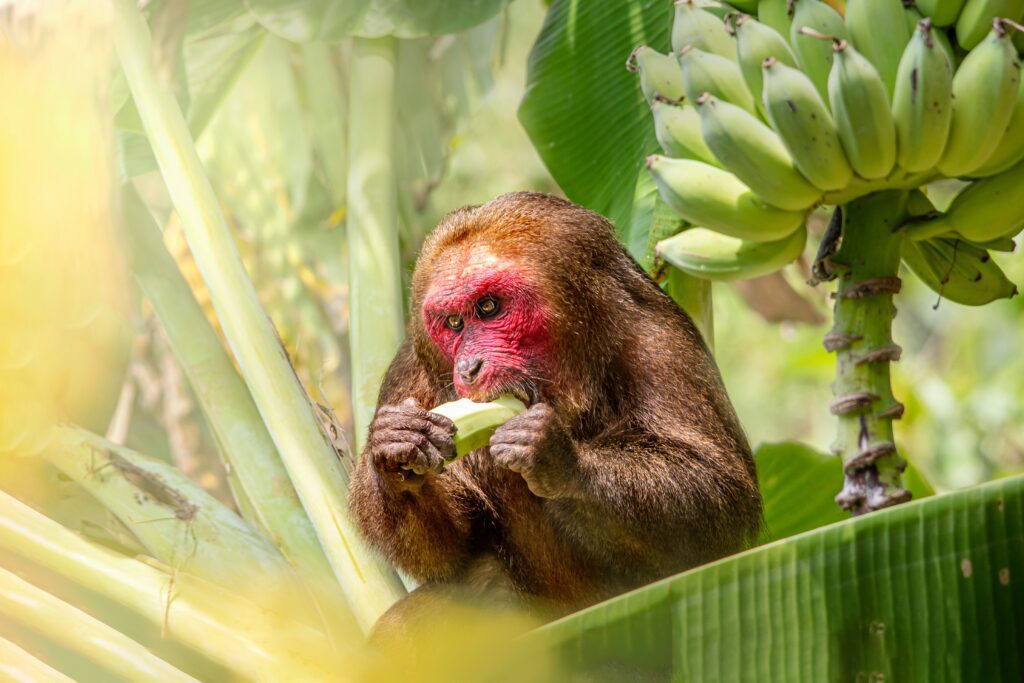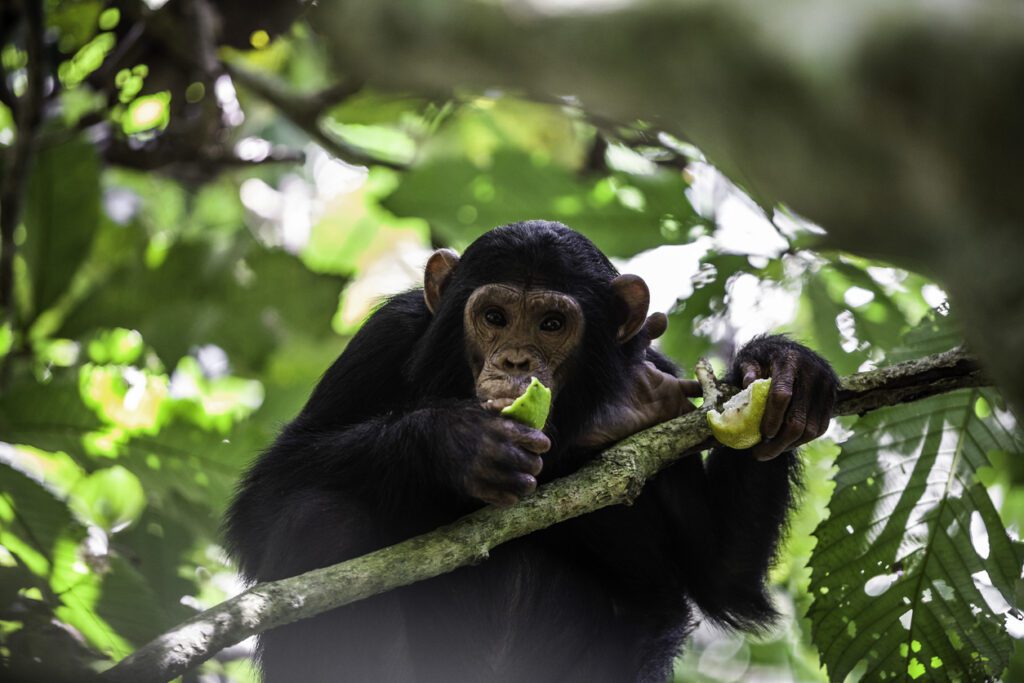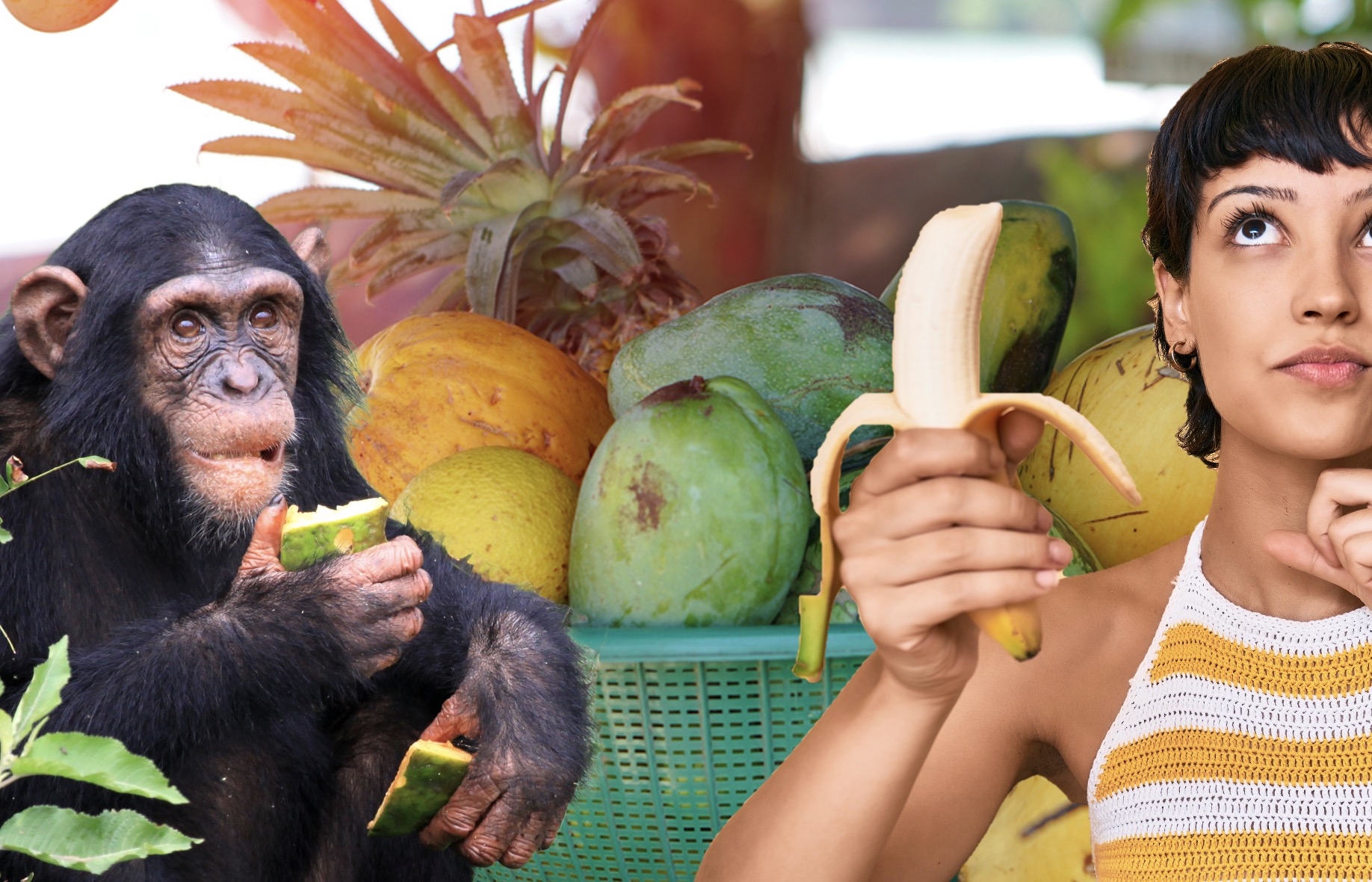A fruit-based diet is not a new idea, but it is gaining more attention with the rising awareness about the frugivorous ancestry and characteristics of humans. However, there is confusion about what fruit-based diets actually consist of, and how healthy they are. The distinction between a “frugivore” and a “fruitarian” diet helps us to get more insight into fruit-based diets and why some things can go wrong!
In a nutshell, a frugivore diet is our species’ natural diet and can be highly beneficial if done right. A fruitarian, fruit-only diet is not biologically appropriate for humans nor sustainable long-term.
In this article, we explore the two related, but distinct, fruit-based diets and how they differ in terms of nutrition.
Why do people even consider a fruit-based diet?
High-fruit, raw nutrition does seem radical at first glance, but there are serious biological aspects to consider before dismissing the idea! A fruit-based way of eating is not a random new diet but rather based on human biology. Instead of another fabricated diet, we desperately need to know what the original natural human diet looks like. After all, we do have a species-specific diet, just like any other species! In the case of humans, this is a tropical fruit-based diet, which is backed up by the mounting evidence of our frugivorous nature. And finally, science is picking up the importance of tropical fruits for health. So let’s dive into the three things we need to know to understand a fruit diet:
- Biologically, humans are specialized fruit-eaters, also called frugivores.
- Cooking is not part of any species-specific diet in the wild.
- Frugivores in nature do not only eat fruits, but a diversity of food groups.
It is self-explanatory that eating the species’ natural diet, which has evolved over time, is essential for the body’s functional integrity – and thus good health. Not surprisingly, real-life experiences show the benefits of adopting a fruit-based diet, like rejuvenation and regeneration. However, there are nutritional shortcomings and risks associated with fruit-based diets, which we have elaborated on in another article.
Biologically, humans are tropical frugivores!
Humans originated in tropical Africa (Daanen, 2016). To understand the implications of this fact in terms of diet, it is important to note that highly frugivorous animals can only live in tropical forests! Humans have not experienced significant evolutionary changes in diet-related biological traits. Only a few specific local adaptations have emerged, which enabled survival in challenging cold environments and their food sources (for example, improved milk digestion or increased tolerance for fire smoke toxins). But we adopted a cultural survival diet (cooked diet) that has far deviated from our ancestral diet and our frugivorous ancestry.
All apes are specialized fruit-eaters
It’s not hard to see that our morphology is that of a tropical frugivorous ape: we share our traits related to diet with our closest relatives, the Chimpanzees, which are specialized fruit eaters. Their staple food is fruit, which makes up around 70% of their diet. Read more here.

Scientific American published a telling article in 2006, written by a primate researcher on the similarity between chimpanzee and human digestion and dietary biology in general, with the headline: “Many characteristics of modern primates, including our own species, derive from an early ancestor’s practice of taking most of its food from the tropical canopy“. Katharine Milton already published a paper in 1999 in the journal Nutrition about why the diet of chimpanzees should inspire the human diet.
“Anthropoids, including all great apes, take most of their diet from plants, and there is general consensus that humans come from a strongly herbivorous ancestry. Though gut proportions differ, overall gut anatomy and the pattern of digestive kinetics of extant apes and humans are very similar.”
K. Milton
Adaptations to a fruit-based diet
Humans have distinct frugivore adaptations (read the full article here): a few examples are the loss of vitamin C genes, complex hands for fruit handling, dental structure, digestive system, and our positive sensory experience with ripe fruits (attractive look, smell, and taste).

We instinctually know that fruits are good for food. Even very young children instinctually are attracted to sweet colorful fruits – unaltered and raw.
Humans also have specialized biochemical features that evolved due to fruit-eating, which are fascinating and hard to deny. For example, the loss of vitamin C genes is a unique trait shared by highly frugivorous animals. The mutation has occurred analogously in those birds, bats, guinea pigs, and primates that take in a lot of external vitamin C through their diet, which made internal vitamin C production non-vital. Another example is the trichromatic specialized color vision (optimal to detect fruits) shared with our primate family.
All species eat a raw diet
Additionally to our anatomical frugivorous traits and genetics, consider this simple species-appropriate instinctual test: everything that is appealing straight from nature is food optimally suitable for humans. Everything that needs to be processed to become safely edible and tasty – like cooking, mixing, or seasoning for flavor – is not really human food. This concept is simple, but it is how we analyze the diets of animals in the wild – instinctual knowledge.
No animal needs to cook their food to survive, but calling the (raw) diet of elephants, monkeys, or seals in the wild “radical” or “extreme” does not cross our mind, ever – only with humans, this has become a thing. And – before you ask – humans have not adapted to a cooked diet, in a way that we are hooked to it. In fact, the only adaptations to cooked foods in humans, are a decreased immune response to it and higher tolerance to fire smoke toxicity! Read more on the topic here.

Differences between “frugivore” and “fruitarian”
What is the difference between frugivore and fruitarian? Simply put, a frugivore diet is what the frugivorous species naturally eat in the wild. In contrast, a fruitarian diet is a fruit-only dietary concept that people can choose to adopt.
A frugivore diet is not a fruit-only diet.
Frugivore and fruitarian is related and often confused, but there are significant differences in food that are included. Hence knowing the difference is important to make informed decisions when you want to adopt a fruit-based diet:
| Frugivore | Fruitarian | |
|---|---|---|
| Concept: | Natural dietary pattern of frugivores observed in the wild | Diet based on frugivory, our natural instincts and ethics |
| Foods: | Tropical fruits, greens, tubers, nuts, seeds, insects, eggs, crabs, some eat meat at times (although not nutritionally required) | Fruits |
| In Common: | Raw and fruit-based | Raw and fruit-based |
Read more on how much animal-based foods (especially meat) chimpanzees consume here.

Conceptual difference between “fruitarian” and “frugivore”
Besides the types of foods included in a frugivore and fruitarian diet, there are essential differences in the underlying concepts:
What is a frugivorous diet?
The “frugivore diet” is the human diet, naturally determined by our biological makeup. It is our species’ natural diet. However, there is no such thing as the frugivore diet. We might more accurately call it a frugivore’s diet, which consists of the foods that frugivorous animals eat in their natural habitat. What this looks like for humans is not entirely clear. However, we can start using our instinctual knowledge and might get inspired by our closest living relatives, the chimpanzees.
The natural diet of frugivorous primates varies from species to species and depends on food availability. Generally, the diet consists mainly -and preferentially – of fruits. Additionally, frugivorous primates forage for nuts, seeds, greens, tubers, insects, and eggs, and sometimes also special foods like mushrooms and crabs, bark, mineral-containing mud and herbs. Hence, a frugivore diet is not necessarily plant-based and contains more protein-rich foods (read more about protein on fruit-based diets here).
It is crucial to understand that those species live in the tropics, where they can access highly nutritious fruits throughout the year – unlike in colder climates. Thus, tropical fruits are essential for a frugivorous diet, also in humans. See here why tropical fruits need to be the staple food on a fruit-based diet and why a diet based on temperate fruits is not suitable or sustainable for us.
Thus a frugivore’s diet is not a choice – it is simply a biological “characteristic.” Humans all have traits that suggest we have a strongly frugivorous ancestry – and indeed still are frugivores. We cannot choose or change such given biological conditions. And… eating a carnivore’s or granivore’s (grain-eater) diet – will not turn us into carnivores or granivores. We then just “eat outside our biology.”
What is a fruitarian diet?
“Fruitarian” is a fruit-only diet that we define and choose to adopt. Fruitarians choose this diet for the well-being of animals, plants, and their own health, too. Unlike a frugivore diet, the fruitarian diet is a concept or principle like “vegan.” Fruitarians are aware that fruits are the only food that plants offer to the consumer within a symbiotic relationship with their seed disperser (read more here). This means the plants benefit from offering fruits! As a consequence, fruits that have coevolved with their consumers have no toxic defense chemicals. Other plant parts are being protected from consumers, especially grains, which contain their embryos, ensuring the next generation of the plant. But also, most green parts and roots are not “willing” to be eaten and thus contain many secondary metabolites that are meant to put-off consumers
What frugivore and fruitarian have in common is – of course – the focus on fruits and the knowledge that tropical fruits are what best sustains our frugivorous body. Also, the two diets strongly overlap: Chimpanzees, for example, seem to have extended periods when they only eat fruit depending on fruit availability. In fact, other type of foods might only be their fallback foods, when fruit is not available (Watts et al., 2011). The consensus in scientific literature is that the Chimps’ preferred food is ripe fruit! Therefore, it is highly likely that humans also can sustain themselves for an extended period on high-quality, ripe tropical fruits only! Which equals the fruitarian diet. Hence, the frugivore diet is sometimes identical to the fruitarian diet, depending on fruit availability in the wild. However, if the body finds nuts and greens appealing, use your instinctual knowledge.

A fruit-based diet is our natural diet, but we need to know how to do this right!
Because humans share most of the dietary biological traits with other frugivorous primates, the significance of eating a diet based on fruits is gaining momentum. However, this diet can easily go wrong if we do not know what we are doing! Yes, we are tropical frugivores, but we are alienated from nature and live outside our natural habitat and thus need to relearn what our species-appropriate diet really looks like. Just “jumping” into a fruit-based diet and “eating fruits only” will not be sustainable in the long run, especially when living outside the tropics, where it is hard to get access to high-quality ripe tropical fruits.
But, when done informed and carefully, step by step increasing ripe delicious tropical fruits into your diet – approaching our species-specific frugivorous diet – could be just what you have been looking for…
To avoid common beginner mistakes, also check out our free frugivore diet guide and feel free to comment or ask anything fruit-related below 🙂
Last updated on:
References
- H.-Y. Ahn, H.-D. Cho, Y.-S. Cho, Comparison of antioxidant effect and phenolic compounds in tropical fruits. SN Applied Sciences. 2 (2020), doi:10.1007/s42452-020-2927-5.
- H. A. M. Daanen, W. D. Van Marken Lichtenbelt, Human whole body cold adaptation. Temperature. 3, 104–118 (2016), doi:10.1080/23328940.2015.1135688.
- K. Milton, Diet and primate evolution. Scientific American (2006) (available at https://www.scientificamerican.com/article/diet-and-primate-evolution-2006-06/).
- K. Milton, Nutritional characteristics of wild primate foods: Do the diets of our closest living relatives have lessons for us? Nutrition. 15, 488–498 (1999), doi:10.1016/s0899-9007(99)00078-7.
- Milton, K. (2004) ‘Ferment in the family tree: Does a frugivorous dietary heritage influence contemporary patterns of human ethanol use?’, Integrative and Comparative Biology, 44(4), pp. 304–314. doi:10.1093/icb/44.4.304.
- K. Cutlip, Did ripening fruit help hominids develop complex hands? Smithsonian Insider (available at https://insider.si.edu/2016/05/did-ripening-fruit-help-hominids-develop-complex-hands/).
- T. H. Jukes, J. L. King, Evolutionary loss of ascorbic acid synthesizing ability. Journal of Human Evolution. 4, 85–88 (1975), doi:10.1016/0047-2484(75)90002-0.
- Trichromacy. Wikipedia (2023) (available at https://en.wikipedia.org/wiki/Trichromacy#Humans_and_other_animals_that_are_trichromats).
- L. S. Carvalho, D. M. Pessoa, J. K. Mountford, W. I. Davies, D. M. Hunt, The genetic and evolutionary drives behind Primate Color Vision. Frontiers in Ecology and Evolution. 5 (2017), doi:10.3389/fevo.2017.00034.
- David P. Watts, Kevin B. Potts, Jeremiah. S. Lwanga, John C. Mitani, Diet of chimpanzees (Pan troglodytes schweinfurthii) at Ngogo, Kibale National Park, Uganda, 2. Temporal Variation and Fallback Foods. American Journal of Primatology. 74, 130–144 (2011), doi:10.1002/ajp.21015.



Hi
I have deep experience in frugivore and fruitarian diet..
I would be interest to publish articles on this website
Could you email me and we could schedule a video call
Thank you so much:)
Hi, thanks for reaching out! I will get back to you via email within the next couple of days. Looking forward to connect 🙂
thank you for this. I had acid reflux and constipation before consuming mostly fruit and I digest perfectly fine on fruit, but will include oats as a survival food and mineral source. what is your opinion of oats? I also rely on soaked medjool dates a lot for minerals, but always rinse out mouth after
Hey Jaylen, thanks I appreciate your feedback! It’s so amazing what conditions we can get rid of by going high fruit! I also had many issues before transitioning into this diet, including many allergies and one autoimmune condition.
I think oats are one of the grains that is a bit easier on digestion than other grains, as it theoretically can be eaten raw. I don’t tolerate them well on my stomach and digestion. I have been tested for antibodies, and oats are one of the foods that I am allergic to. So this might be related. Maybe you can see how it affects your body by leaving it out for a while and then trying again. I personally prefer to eat a cooked meal from time to time than eating raw foods, that are not really suitable for our bodies. I know cooked foods are not species-specific, and our ancestors used them for survival. But some foods that are mainly carbs (sweet potatoes, tubers, or green peas; I also eat white rice as survival food) are not that harmful cause they do not contain that many denatured proteins, as protein-rich cooked foods.
also what is your opinion on modern water lacking minerals? as a result I will drink my water that I used to soak dates in.
I personally try to get real spring water. But I am a bit privileged in this sense as I live by mountains and in a very water-rich region. So, if you can’t get spring water and you need to filter or distill your water, it is very important to remineralize it properly. I am not an expert in this, though. Date-soaked water is a great idea, I think, but it probably needs more minerals.? Honestly, I don’t know the answer to this, and I think it really depends on where you live and what type of water you can access.